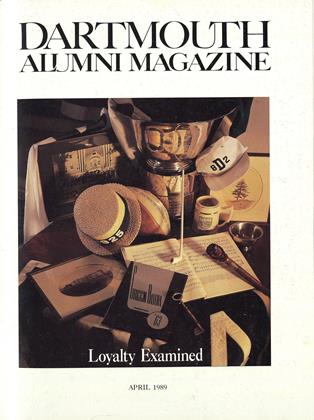The air force for which John W. Orange Jr. '71 is chief financial officer is probably bigger than those of most third-world countries and a good deal more cost-effective. We're talking about Flight International, a publicly held company that not only can claim multimillion-dollar contracts with the U.S. Department of Defense but also saves the government "an unbelievable amount of money," according to Orange. He's not a pilot himself, but he's been the CFO for two years and was the principal architect in restructuring the company's financial procedures. And last year he successfully shepherded Flight International's second public offering—a million shares at $l2.
What Flight International does is buy used corporate Learjets for about a million bucks each, and then spend another million turning the aircraft into combat-ready trainers that test the skills of U.S. Air Force pilots in F-15s—and army and navy weapons systems—during practice dogfights and attacks. An F-15 costs Uncle Sam about $35 million new and about $7,500 an hour to operate (ten bucks a mile?). With close to a hundred aircraft, more than half of them jets, Flight International imitates the enemy for a tiny fraction of that, using pilots who are mostly experienced combat veterans. The result: the Pentagon is happy and Flight International is expected to more than double its revenues between 1988 and 1990, when the target is $100 million. Some of the increase is likely to come from foreign contracts—the company is already working with the Dutch and Italian navies.
CFO Orange—an economics major at the College and co-captain of the soccer team—is quick to downplay the warlike nature of his company's business. In a profile in CFO Magazine he was quoted as saying they're really a bunch of "peaceniks." A real war could put them out of business.
 View Full Issue
View Full Issue
More From This Issue
-
 Cover Story
Cover StoryLoyalty's Roots
April 1989 By Katie Crane -
 Feature
FeatureSix Questions for the Candidates
April 1989 -
 Feature
FeatureIT'S GOOD
April 1989 By Dinesh D'Souza '83 -
 Feature
FeatureIT'S BAD
April 1989 By Edward C. Ingraham '43 -
 Feature
FeatureHis Honor, Jock McKernan
April 1989 By Thomas Lynn Avery '70 -
 Feature
FeatureA WOODSTOCK BARGAIN—NO KIDDING
April 1989
R.H.N
-
 Article
ArticleSneakermania ... and a '62
FEBRUARY 1989 By R.H.N -
 Article
ArticleCheck your Local Listings
APRIL 1989 By R.H.N -
 Article
ArticleMr. Fix-It From '83
APRIL 1989 By R.H.N -
 Article
ArticleTHE DOCTOR IS IN [CHINA]
MAY 1990 By R.H.N -
 Article
ArticleTom George ’40 Reinvents Himself
JUNE 1990 By R.H.N -
 Article
ArticleThe Hood's Alumni Shows
SEPTEMBER 1990 By R.H.N








